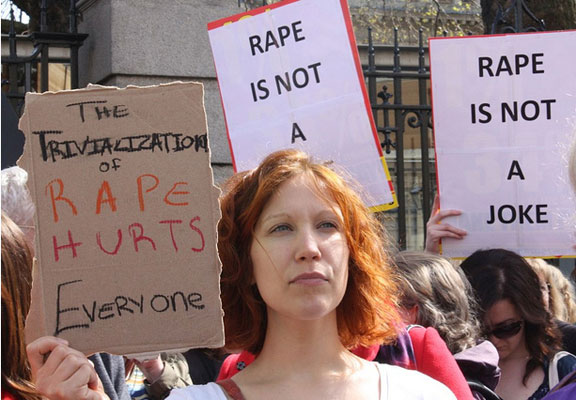

Credit: Workers Solidarity Movement/wsmireland on Flickr, under Creative Commons
WASHINGTON (WOMENSENEWS)–When I was raped back in 2011, I thought it was the most traumatic experience of my life. But I was wrong. What was more traumatic was the way the city’s Metropolitan Police Department treated me after being raped.
There is hope. A bill under consideration by the council aims to ensure that future sexual assault victims are not treated the way I was.
Being raped was terrifying, humiliating and degrading. But it was just one night of my life, and I hoped that with the passage of time, counseling, support and understanding I would heal. I knew I was not to blame. But I was feeling very vulnerable when I approached the Metropolitan Police Department. Instead of kindness or even professionalism, I was treated with skepticism, made to feel I was to blame and forced to go through a confusing and lengthy process just to try to make a report and get them to take it seriously.
It never occurred to me not to report this crime to the police. I’ve spent the majority of my professional career as an advocate for a victim-centered approach to another crime and I’ve met and trained with wonderfully dedicated law enforcement officials throughout the country, and around the world. I had great respect for the thousands of police officers who risk their own lives every day to keep our community safe.
I Froze, Which Meant ‘Consent’
So I was completely unprepared for way I was treated. I didn’t expect that reporting this crime would be easy, but I did expect to be taken seriously. Instead, the sexual assault detective who interviewed me suggested that while my words were saying no, my actions were saying yes. Like many victims, I froze when I was attacked. The officer told me that was really consent. No, it was not. She also told me that if the assailant were arrested he would probably lose his job, implying that I would be ruining his life, as if the assault didn’t have any impact on mine.
I endured six weeks of being repeatedly questioned by the detective about my behavior that night. Eventually the detective told me that she personally thought it was a weak case but her supervisor was making her fill out an arrest warrant anyway “just in case.” He was never arrested.
I wish that my experience were nothing more than the ill-timed misfortune of catching an overworked detective on a bad day, but the Metropolitan Police Department’s response to rape victims has been a systemic problem documented by a 2008 lawsuit, a 2013 Human Rights Watch report called “Capitol Offense” and by a local law firm, Crowell and Moring, retained by the City Council to independently review the report.
And while the law firm raised some questions about the researchers’ lack of access to personally identifying data that the police would not share, it testified to the council that survivors’ reports of mistreatment were very real and made several recommendations for improvements in both policy and oversight.
Bill Raises Hope
The proposed Sexual Assault Victims’ Rights Amendment Act of 2013 would enhance the processing of sexual assault forensic examination kits; grant sexual assault victims the right to have a trained sexual assault victim advocate present at medical and law enforcement proceedings (with certain exceptions); establish confidentiality between survivors and sexual assault victim advocates; and strengthen oversight and accountability of the D.C. police.
But while the bill is an important step toward protecting rape survivors, it lacks several of the most important recommendations made by Crowell and Moring and supported by more than 50 public witnesses that testified in a day-long public hearing last December.
These include a system for case review by experts together with the police and oversight by an independent expert consultant who would be accountable to the council and the mayor’s office. And though the bill establishes the right to a victim advocate, it would allow law enforcement officials, prosecutors and even defense attorneys the right to exclude an advocate if they consider the person’s presence detrimental to the case; a loophole so large it means that victims wouldn’t have that right at all.
To date, more than 350 sexual assault survivors, direct service providers, advocacy organizations and community members have joined forces in the DC Justice for Survivors Campaign to advocate for the passage of the bill with the addition of these recommendations as part of a larger effort to strengthen the response to sexual assault in Washington, D.C.
The D.C. City Council has a real opportunity here to protect sexual assault victims, but without these key provisions the bill lacks the weight to make protection a reality.
Similarly, the district’s Metropolitan Police Department has a chance to restore the faith of victims and the public in their ability to respond to cases of sexual assault by embracing the opportunity to work with an expert consultant and agreeing to submit to rigorous independent oversight.
If a strong bill passes and is approved by Congress and put into effect, I’d encourage rape survivors to report this crime to police. But unless or until it does, I’m afraid my experience will have to be a cautionary tale, and rapists will continue to act with impunity here in the nation’s capital.
Marisa Ferri is a survivor of sexual assault and a community advocate working to increase the rights of and improve services for survivors of sexual assault in the District of Columbia.
Would you like to Comment but not sure how? Visit our help page at https://womensenews.org/help-making-comments-womens-enews-stories.
Would you like to Send Along a Link of This Story? https://womensenews.org/story/rape/140310/take-it-me-dc-rape-bill-needs-more-muscle

